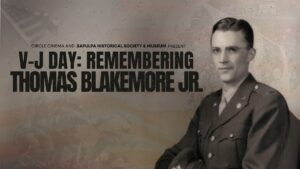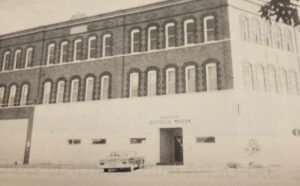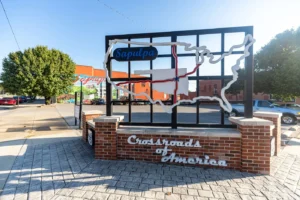Rachel Whitney,
Curator, Sapulpa Historical Museum
This week in Sapulpa history, a Police Matron named Mabel Bassett had arranged entertainment for the young children of the city. Mabel Bassett was the town’s first Police Matron. In her work, she was at the forefront of helping the poor, women, and children, and the downtrodden. On August 7, 1913, townsfolk and Mabel were able to end the summer days before school started on a high note.
Mabel Bassett organized a group of citizens to help bring entertainment to about 150 children. These children piled into ten or so “big autos.”
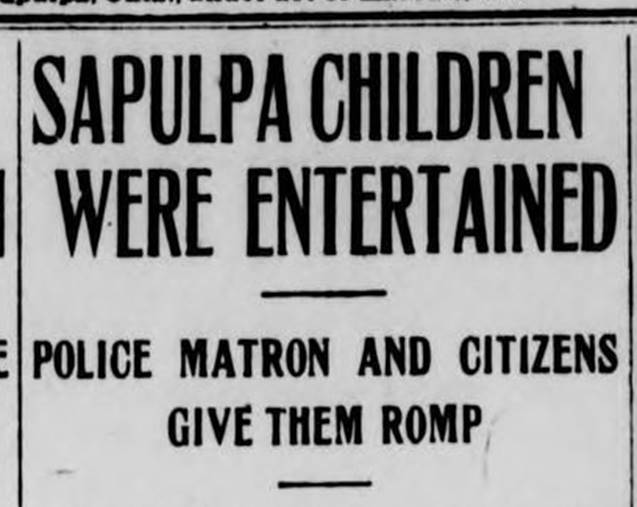
In 1913, not many streets had complete pavement, however, that didn’t stop the enjoyment of riding in the back of the car. “Piled into autos, the kids were thrilled over the paved streets of Sapulpa for two hours.”
Ten citizens helped along with Mabel to take the children to the big lake. They were able to spend another hour or so in the water. They sipped on ice-cold lemonade that evening. “The ‘party’ lasted four hours and not a mishap occurred.”
That same week, Mabel Bassett put an ad in the paper pleading for old school books. She said she would gladly take in any book that pupils had finished, and give them to students in need.
The town praised Mabel for her service. “It is such things as these that helps a community, brings neighbors closer together, and teaches love for the better in the hearts of the rising generations. Mrs. Bassett is doing splendid work.”
More on Mabel Bassett: Mabel Bourne was born in Chicago on August 16, 1876. Mabel was the only child of Stephen Bourne and Martha Ellen Bourne. Stephen was a merchant in Chicago and had been a Civil War veteran. Martha, a suffragist, was one of the first women in the country to edit a newspaper.
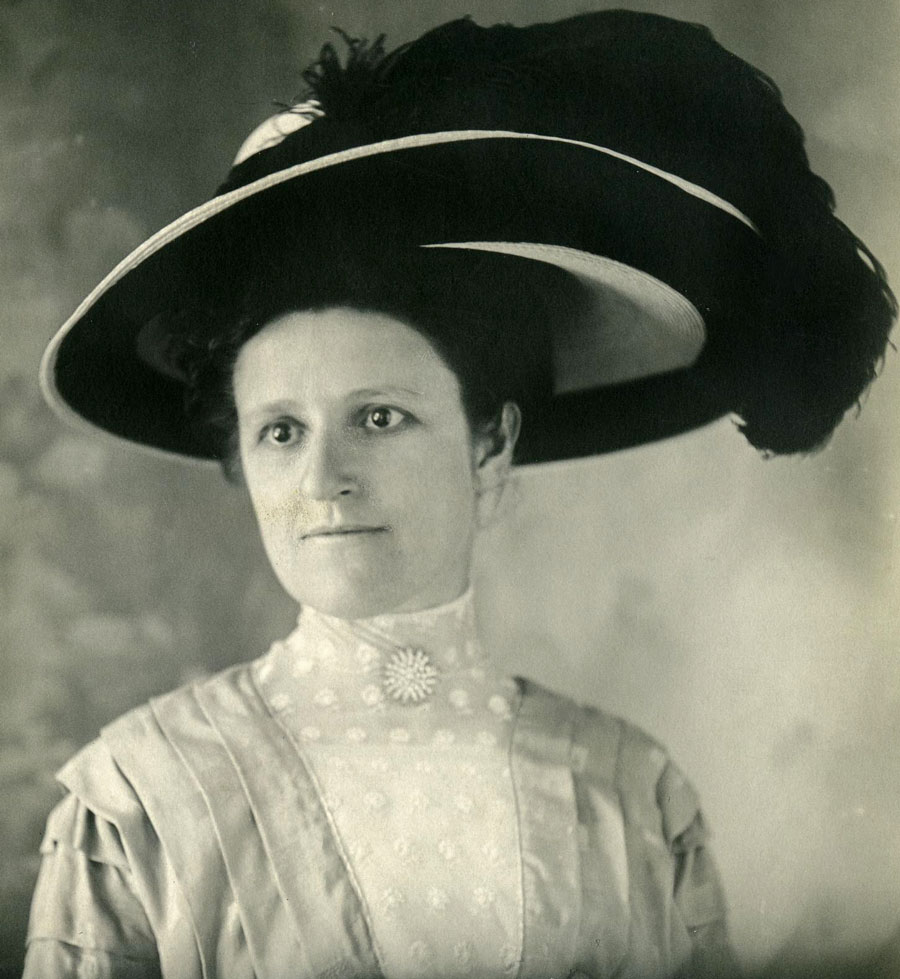
Mabel found fame at an early age. At ten years old, she began giving beautiful readings, establishing her as a great child elocutionist or orator. With this, her family hoped she would have a stage career. However, she used her voice for another stage, as a public servant.
Mabel married her husband, Joseph Bassett, a railroad conductor, at the age of 16. She continued her schooling and graduated in St. Louis from Missouri School of Social Economy*. They had three children Clara, Clyde, and Herbert.
*Note: Today, the program is named School of Social Work at the University of Missouri.
The family moved to Sapulpa, Indian Territory, in 1902. They lived at 318 S Linden. Joseph continued his work for Frisco. By 1910, Joseph became a night guard at the County Jail; he retired the following year.
Mabel, in 1910, organized the Creek County Humane Society, one of the first in the state. She also helped establish the first Children’s Home, at 408 S Walnut.
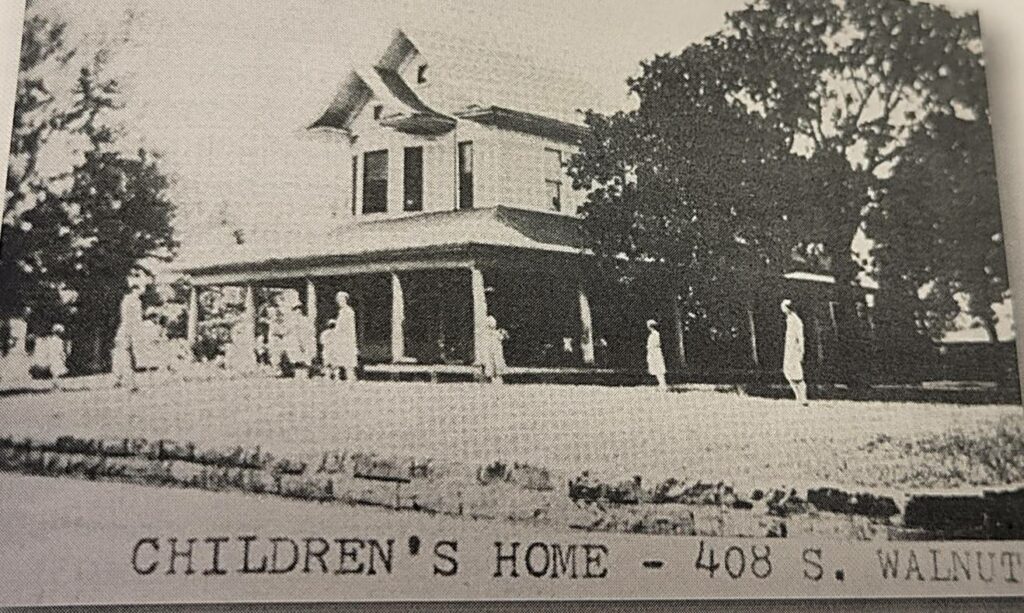
At the same time, she and her family were managers and editors of the local newspaper, the Sapulpa Daily Star. Herbert was the circulation manager and Mabel became the society editor*.
*Note: Sapulpa Daily Star was owned and operated by Joseph and William Cathriner; this was located at 8 N Water. It was short-lived, until mid-to-late-1913, when it was sued for libel, and lost the case.
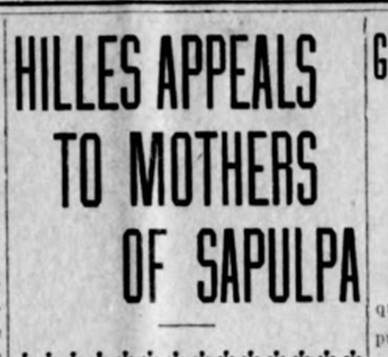
In August 1911, Mark Hillies, Commissioner of Public Safety, advised the town that he believed it would be in best interest to retain Mabel Bassett as Police Matron. “Since my incumbency of the office, Mrs. Bassett has rescued four young girls…she daily administers to the sick and poor, aiding those who are distressed…she saves her salary many times over by providing ways for the distressed, sick, and poor.” He further explained that she would not have the authority as a patrolman, with arrests, raids, etc. but to aid those in need.
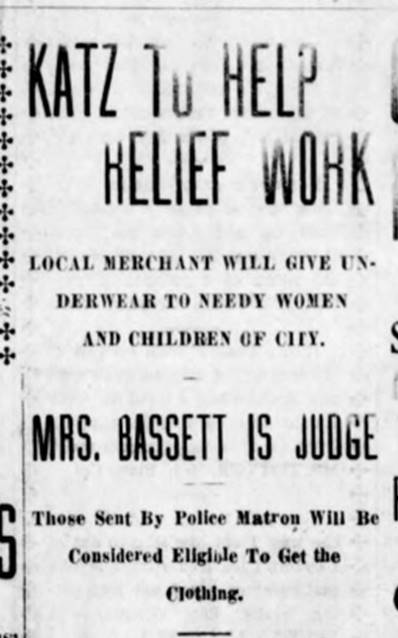
The following winter, January 1912, the Katz Department Store owner, Lester Katz, wanted to donate from his inventory “proper winter clothing” for those in need. He teamed up with Mabel to donate the clothes to the ones coming to Mabel’s office: children, mothers, and even working men.
In 1913, Mabel Bassett wanted to pursue more, outside of Sapulpa, to aid the state. In September 1913, she announced her plans to run for the State Office of Charities and Corrections*.
*Note: The office was established in 1907 to investigate the entire system of public charities and corrections in the State; such as jails, prisons, industrial schools, hospitals, dispensaries, orphanages, and many others were under the umbrella.
Ten years later, in 1923, she became Commissioner of the Charities and Corrections. She held this position until 1947. She had stayed in Sapulpa in those 10 years before gaining the position as the Police Matron and Humane Agent.
While in office, Bassett followed the footsteps of Kate Barnard, the first woman to hold state office in Oklahoma*. During this time in office, the Legislature underfunded the office, but she managed to achieve many tasks.
*Note: Kate Barnard, elected in 1907, was a key player in educational laws, ban on child labor, and handled many acts of public service.
Mabel Bassett established a women’s unit of the Oklahoma State Penitentiary. She also is credited to making wife-and-child-desertion a felony. Mabel also was among the first to promote a State Pardon and Parole Board in Oklahoma, and standards for state juvenile and state’s mental institutions. In 1925, also to her credit, she transferred African-American juvenile delinquents from the State Penitentiary to a Training School, or Industrial School, in Boley*.
*Note: This would become the John Lilley Correctional Center.
In 1932, she ran on the Democratic ticket for a seat in the House of Representatives. She lost to a Moore teacher, Will Rogers.
Mabel retired in 1947. When Mabel passed in 1953, Governor James Berry had ordered her body to lie in state at the State Capital’s Blue Room, so the public could mourn her passing.
Today, the Mabel Bassett Correctional Center is a prison for women located near McLoud, opened in 1974, was named in her honor for her civil duty. She was also inducted into the Oklahoma Hall of Fame in 1937 for her public service.
“As long as there’s breath left in me, I’m going to fight for the people who put me here,” Mabel Bassett.
(Information from Mabel Bassett Correctional Center; Oklahoma Hall of Fame; Oklahoma Historical Center; Wikipedia)



